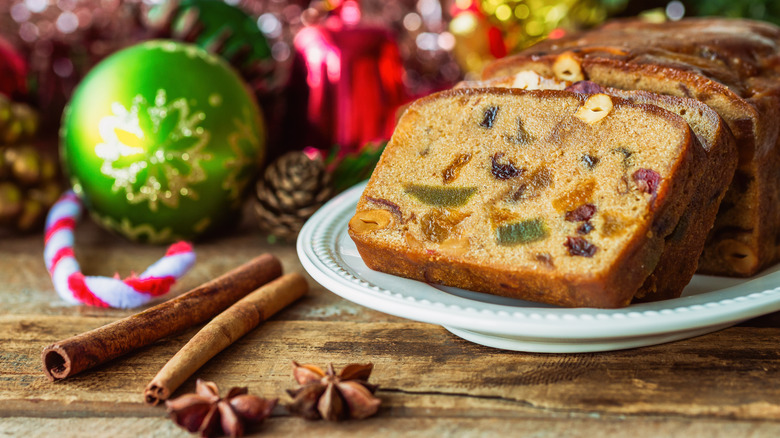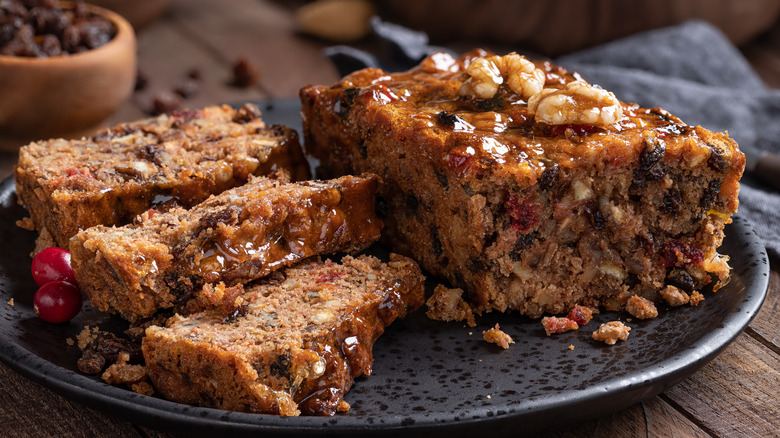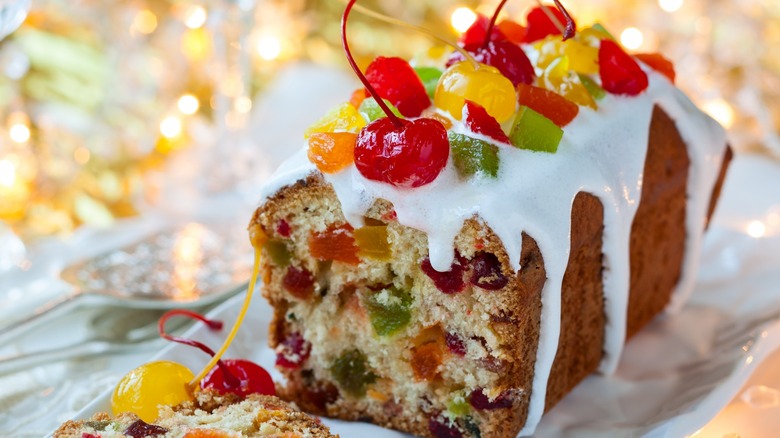How Does Fruitcake Stay Edible For The Entire Year?
There is a longstanding myth (or perhaps just a joke) that there's no such thing as freshly-baked fruitcake – the same fruitcakes from times of yore just keep getting passed around from one family to another, because nobody wants to eat it. This classic holiday confection has a reputation that says no one actually likes it, and that it lasts forever without spoiling. In reality, millions of pounds worth of fruitcakes are made each year, but there is a kernel truth to the everlasting nature of this dessert. What keeps them safely edible for weeks or months — and yes, up even a year — is a combination of booze, ingredients with very little moisture, and (in the case of commercially produced fruitcakes) preservatives.
Fruitcake has incredible staying power, and we're not just talking about shelf life. Cakes made with dried fruit have been an important source of food in various civilizations for thousands of years. It's been suggested that the ancient Romans made a type of fruitcake that was sweetened with dried fruit, honey, and wine. Soldiers in World War I also carried the dense cakes as part of their food rations, because the fruitcakes simply didn't go bad.
Today, while energy bars and trail mix might be the more popular choices for long-term sustenance, fruitcake is certainly endeared as a symbol of the winter holidays and a sweet treat that you can pick at from one December to the next, if you really wanted to.
High alcohol plus low moisture equal great preservation
Natural preservation is the name of the game when it comes to traditional fruitcake recipes. The cakes are famously soaked in or generously brushed with liquor like dark rum, whiskey, or brandy, which imparts flavor, of course, but also greatly diminishes the presence of bacteria, which causes food to spoil. Even without storing it in the refrigerator, the alcohol in fruitcake keeps it edible and free from mold growth for quite a long time.
As for the fruit in fruitcake, you may find dried pineapple, apricots, raisins, cherries, and dates. These ingredients are used in their dried forms because moisture is often what causes food to spoil (and the dense fruit also contributes to the cake's reputation of being as heavy as a brick). Since bacteria needs moisture to grow and thrive, foods that have less moisture stay good for far longer. Because fruitcake is so densely packed with fruit and nuts, there isn't much room left for air pockets, which give traditional cake its light texture. This also means that there really isn't an opportunity for fruitcake to go stale — it simply stays dense and mostly unchanged.
So, exactly how long will a fruitcake last? As reported by Scientific American, the United States Department of Agriculture says a fruitcake with no booze can last about six months in the pantry and a year in the refrigerator. However, fruitcakes soaked in alcohol can last for several years.
Other foods with long shelf lives
Fruitcake certainly isn't unique in that it has an impressively long shelf life. Canned goods like meat, fish, and some vegetables (those with low acid) will stay safely edible for a year or more, as will dried rice, beans, and pasta (due to their lack of moisture). Meat jerky has been dehydrated, owing to its long shelf life as well. Beyond these obvious examples, there are even other baked goods that can survive for a long while without refrigeration.
Hardtack is a type of dry, hard cracker has been made by humans for thousands of years, and has been used throughout history to sustain travelers on long journeys. It's said to remain edible for over 100 years. Made with flour, water, and salt, it's not the most flavorful snack, but when dunked in soup or coffee, it softens up.
While the aforementioned foods can largely be considered "survival" supplies, fruitcake is comparatively a treat. Whether you like it not, it's impressive that a sugar-filled indulgence can last such a long time, considering the far more delicate and perishable nature of other cakes. Fruitcake's longevity as a holiday tradition makes it a true symbol of gift giving — a gift that certainly keeps on giving for a long, long time.



